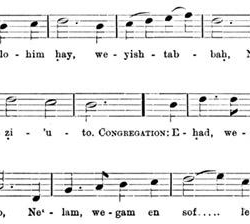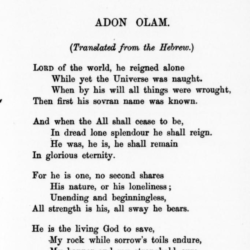Contributor(s): Shared on: 5 December 2021 under the Creative Commons Zero (CC 0) Universal license a Public Domain dedication Categories: Tags: | Source (Hebrew) | Translation (English) |
|---|
אֲדוֹן עוֹלָם אֲשֶׁר מָלַךְ
בְּטֶֽרֶם כׇּל־יְצִיר נִבְרָא׃
לְעֵת נַֽעֲשָׂה כְּחֶפְצוֹ כֹּל
אֲזַי מֶֽלֶךְ שְׁמוֹ נִקְרָא׃ |
Universal Lord! who the sceptre sway’d
Ere creation’s first wondrous form was framed:
When by his will divine all things were made,
Then King, Almighty, was his name proclaim’d! |
וְאַֽחֲרֵי כִּכְלּוֹת הַכֹּל
לְבַדּוֹ יִמְלֹךְ נוֹרָא׃
וְהוּא הָיָה וְהוּא הֹוֶה
וְהוּא יִֽהְיֶה בְּתִפְאֲרָה׃ |
When all shall cease, and this world’s system o’er,
Then he tremendously alone will reign:
Who was, who is, and will evermore
In most refulgent glory still remain |
וְהוּא אֶחָד וְאֵין שֵׁנִי
לְהַמְשִׁיל לוֹ לְהַחְבִּירָה׃
בְּלִי רֵאשִׁית בְּלִי תַּכְלִית
וְלוֹ הָעֹז וְהַמִּשְׂרָה׃ |
Sole God! unequall’d and beyond compare:
Without division or associate;
Without commencing date, or final year
Omnipotence is his, and regal state. |
וְהוּא אֵלִי וְחַי גּֽוֹאֲלִי
וְצוּר חֶבְלִי בְּיוֹם צָרָה׃
וְהוּא נִסִּי וּמָנוֹס לִי
מְנָת כּוֹסִי בְּיוֹם אֶקְרָא׃ |
He is my God, my living Redeemer,
My shelt’ring rock in a distressed hour;
My refuge, my standard, and protector,
My lot’s disposer, when I seek his power |
בְּיָדוֹ אַפְקִיד רוּחִי
בְּעֵת אִישַׁן וְאָעִֽירָה׃
וְעִם רוּחִי גְּוִיָּתִי
אֲדֹנָי לִי וְלֹא אִירָא׃ |
Into his hands my spirit I consign.
Whilst wrapt in sleep, and when again I wake:
And with my spirit my body I resign
The Lord’s with me, no fears my soul shall shake. |
“Adon Olam” is a piyyut that became popular in the 15th century and is often attributed to Solomon ibn Gabirol (1021–1058) and less often to Sherira Gaon (900-1001), or his son, Hai ben Sherira Gaon (939-1038). The variation of the piyyut appearing here is the 10 line (5 stanza) version familiar to Ashkenazi congregations. (Sefaradi siddurim have 12 line (six stanza) variants, and there are some with 14 or 15 lines.) The translation appearing here by Tsvi Hirsch Filipowski (1816-1872) is as found on page 2 of his siddur Tefilot Yisrael (1862). Source(s)
 Tsvi Hirsch Filipowski (1816-13 July 1872), Hebraist and actuary, sometimes referred to as Herschell Phillips Filipowski. A maskil born in Virbalis, Lithuania, he arrived in London in 1839 and taught Jewish boys. In 1846 he published Mo’ed Mo’adim, a study of Jewish and other calendars, and in 1847 The Annual Hebrew Magazine (Hebrew title Ha-Asif, The Harvest’). His A Table of Anti Logarithms appeared in 1849, and his translation from Latin into English of Napier’s treatise on logarithms in 1857. In 1851, when he was listed in the Census as a London printer, he founded the Chevrat Me’orerei Yeshenim (Hebrew Antiquarian Society) in order to publish medieval Hebrew texts. Major works that he edited and printed for it included Menahem ibn Saruq’s Mahberet Menahem (1854) and Abraham Zacuto’s Sefer Yuhasin ha-Shalem (1857). During the late 1850s he worked in Edinburgh as an actuary, returning to London in about 1860. He compiled the Colonial Life Assurance Company’s 1861 Almanac and edited Baily’s Doctrine of Life Annuities and Assurance (1864-6). In 1862 he published, using a Hebrew type of his own design, Tefilot Yisrael, a pocket edition of the Ashkenazi prayer book with his own English translation. In 1867 he founded a short-lived periodical, The Hebrew National. His Biblical Prophecies (1870) dealt mainly with messianic passages in Isaiah. Shlomo ibn Gabirol (also Solomon ben Judah; Hebrew: שלמה בן יהודה אבן גבירול, Arabic: أبو أيوب سليمان بن يحيى بن جبيرول Abu Ayyub Sulayman bin Yahya bin Jabirul, Latin: Avicebron or Avencebrol; 1021/22-1058), born in Malaga, Spain was an Andalusian poet and Jewish philosopher. He published over a hundred poems, as well as works of biblical exegesis, philosophy, ethics, and satire. Aharon Varady (M.A.J.Ed./JTSA Davidson) is a volunteer transcriber for the Open Siddur Project. If you find any mistakes in his transcriptions, please let him know. Shgiyot mi yavin; Ministarot naqeni שְׁגִיאוֹת מִי־יָבִין; מִנִּסְתָּרוֹת נַקֵּנִי "Who can know all one's flaws? From hidden errors, correct me" (Psalms 19:13). If you'd like to directly support his work, please consider donating via his Patreon account. (Varady also translates prayers and contributes his own original work besides serving as the primary shammes of the Open Siddur Project and its website, opensiddur.org.) Read a comment / Leave a comment (moderated) Works of related interest: |









Leave a Reply